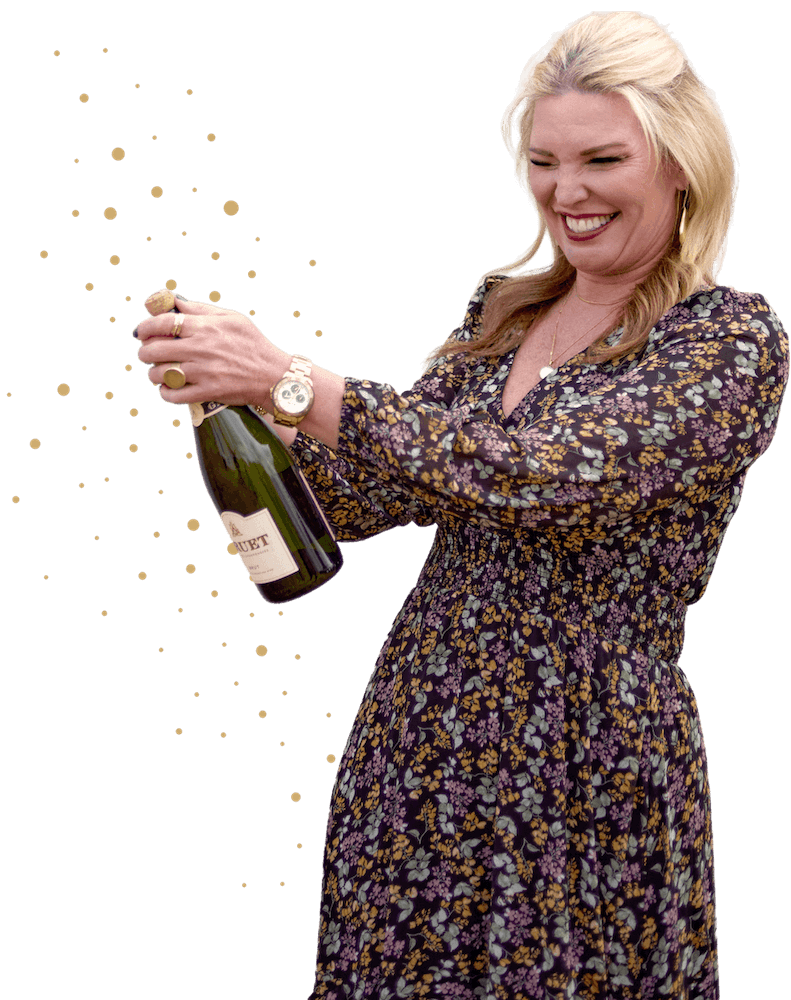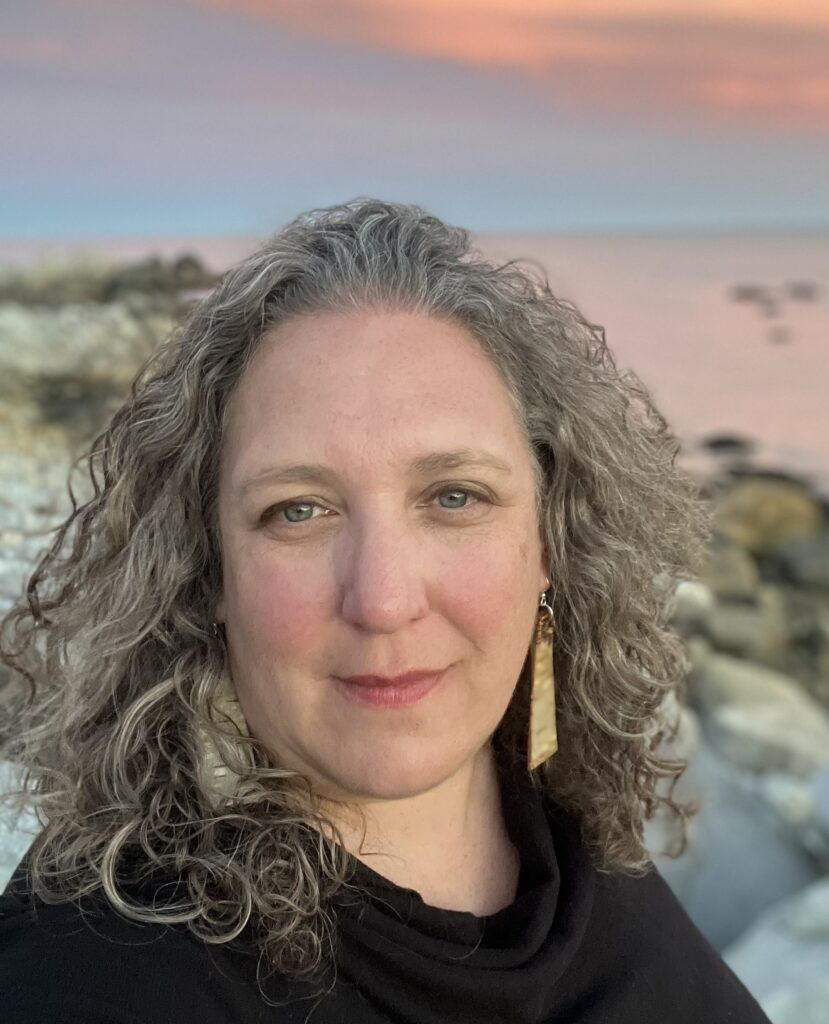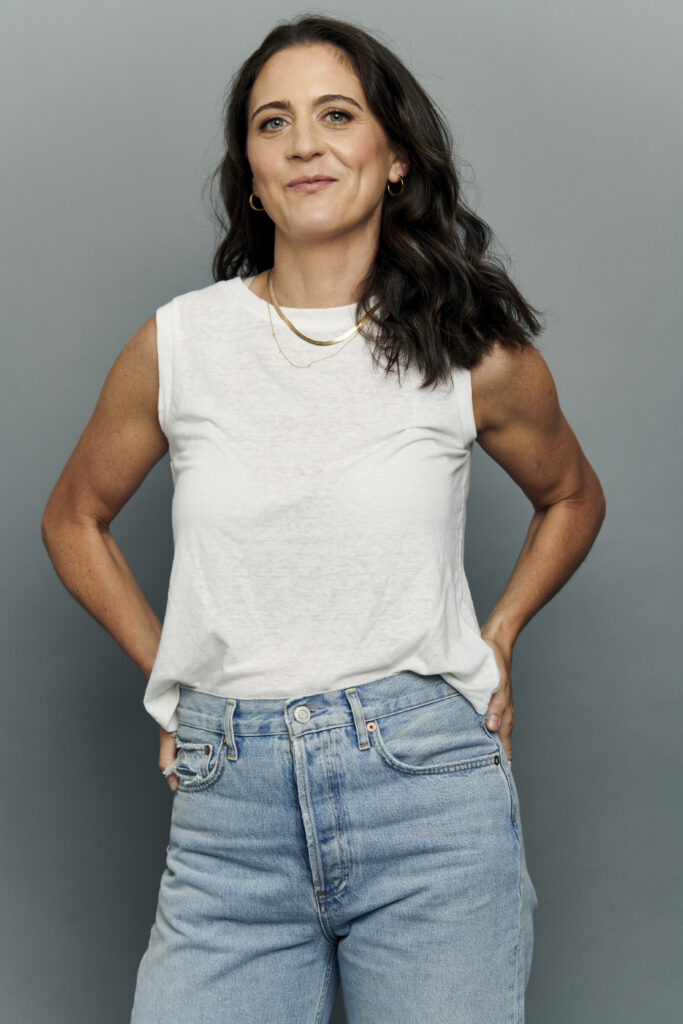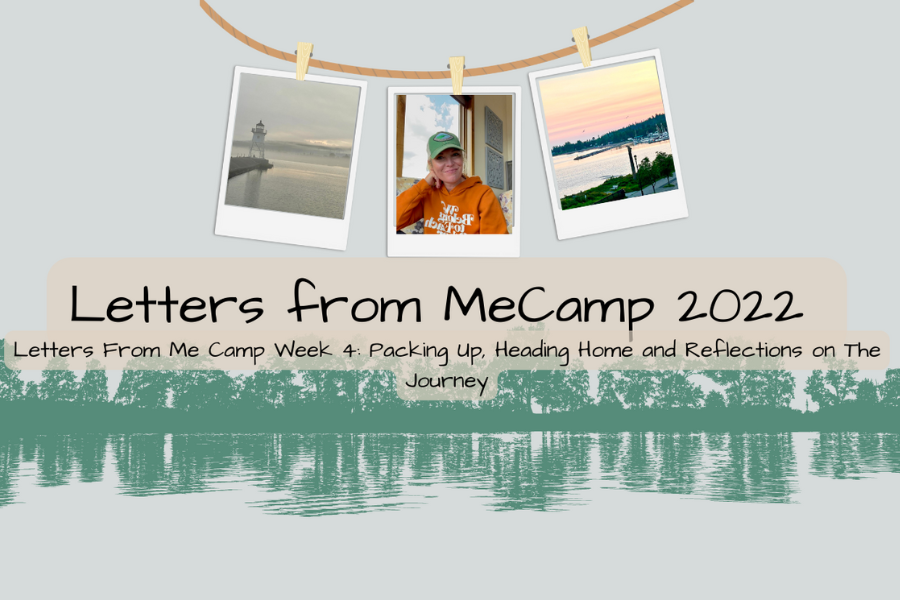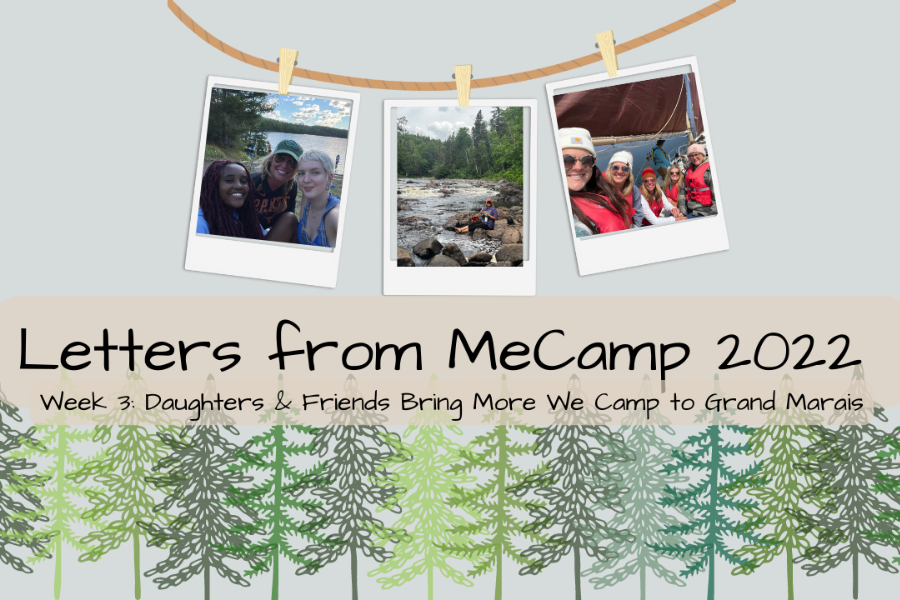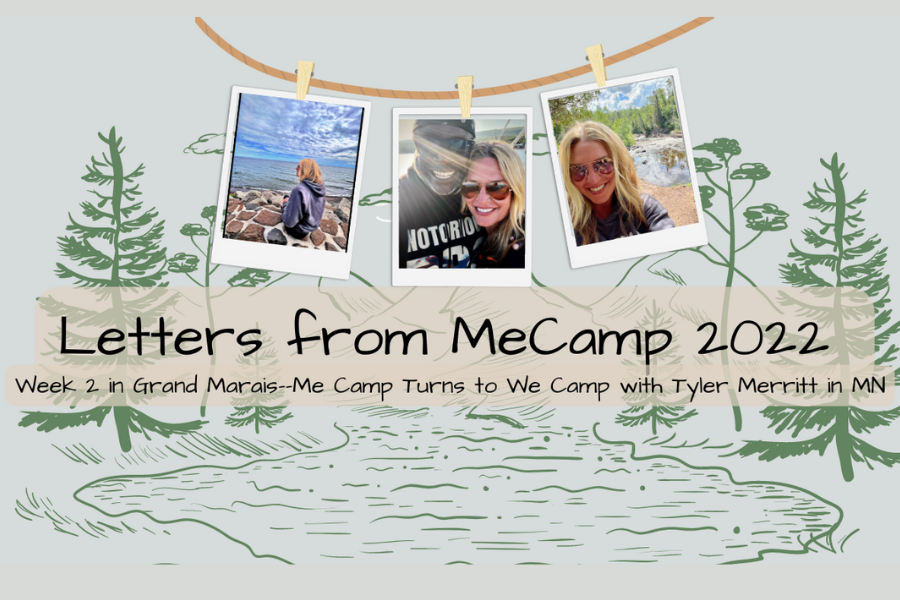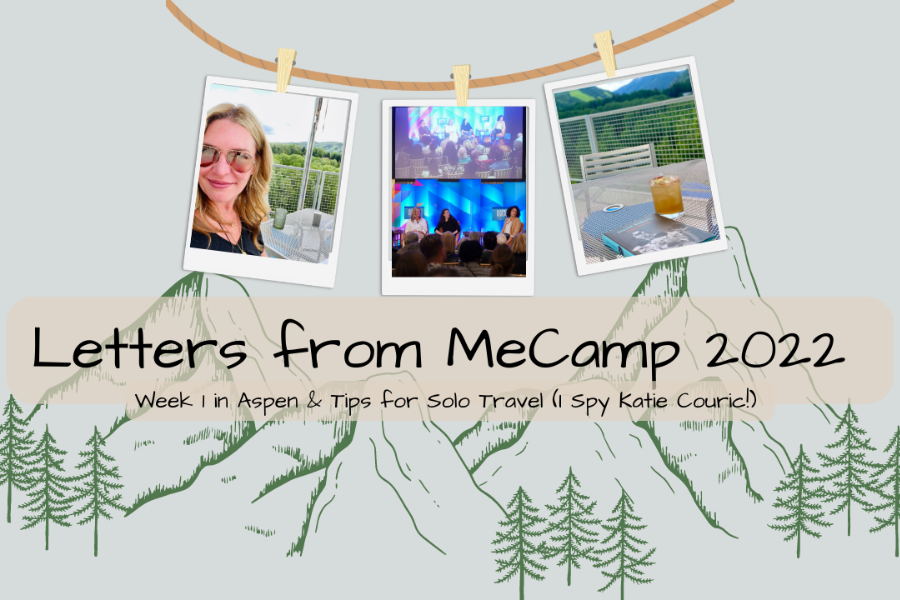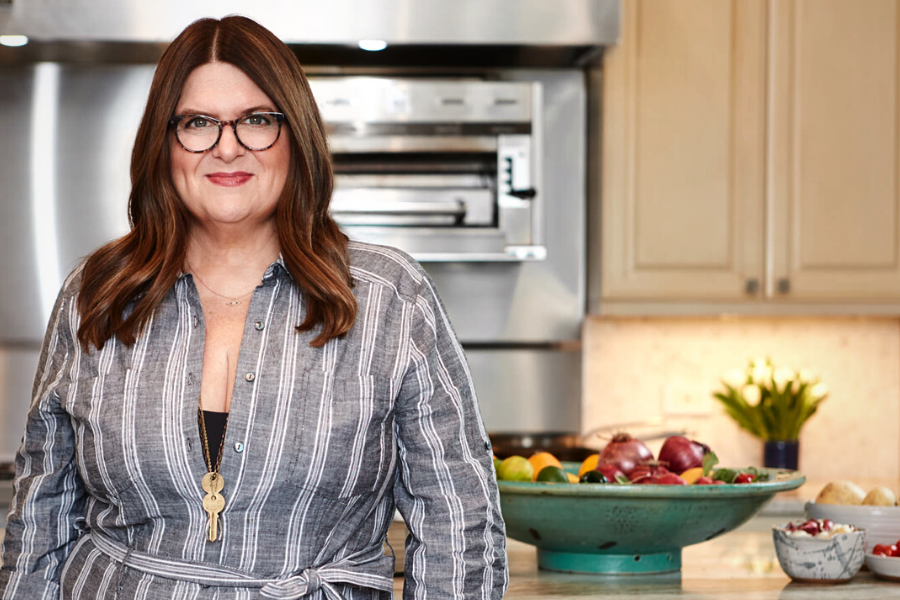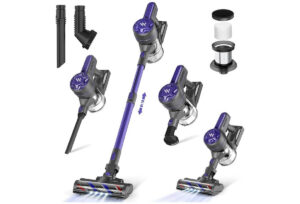
January 2025: Ruth Ware’s The Woman in Cabin 10
Isn’t that why we love reading crime? It’s because you can have bad things happen in a fictional world. It doesn’t always get tied up in every single respect and yes, there’s sadness in terms that someone is usually dead. But there is some kind of restorative justice at the end. – Ruth Ware
Episode 31
It seemed like a good idea at the time… a twisty, suspenseful thriller set on a cruise ship. How could this not be the perfect story to build a little buzz and excitement in my community ahead of our upcoming Jen Hatmaker cruise? Did we get more than we bargained for?
Ruth Ware’s writing has rightfully been compared to that of suspense-queen, Agatha Christie, for featuring everyday female protagonists often white-knuckling it through some treacherous situations in places where they are isolated from any rescue – a glass house in the woods, an excluded ski resort, a remote tropical island, a boutique cruise ship!
Today, Jen sits down with the author of our January 2025 JHBC pick to navigate the many twists and turns of The Woman in Cabin 10 and why so many of our readers are losing sleep this month thanks to her innate skill of setting a heart-pounding scene.
Jen: Hey, everybody, welcome to the Jen Hatmaker Book Club podcast edition. Glad that you are here. This conversation is delightful. So here’s the deal. Hey, I love mysteries. Honestly, that’s what I was raised on. I read all my mom had I think three shelves full of Agatha Christie paperbacks. Just that was all it was. And I, I think I read every one and several of them more than once. So, I was raised on the genre. I love the twists. I love the secrets. I love that particular style of writing.
And that is what we have today. We’ve got Ruth Ware. And she has been compared endless amount of times to Agatha Christie. And of course, anybody who’s read her books knows why. And it is the highest compliment. Obviously, her books are the kind that have you sleeping with the lights on. They are so good. And we revisited, just a monumental bestseller by Ruth Ware, which is called The Woman in Cabin 10. And I’ll tell you why we did.
And I told her this too, in the interview. But as this comes out, we are preparing for the Jen Hatmaker Cruise. And so nobody can ever say we don’t often act cheeky. Okay. We did, we acted cheeky. And we’re like, you know what? Let’s, let’s do some overlap here. And for book club, let’s choose a book set on a cruise ship about murder.
And then let’s invite a bunch of people on a cruise. Yay! So that’s literally why we selected this book for January. So you probably know this if you are around books at all. But Ruth Ware is the queen of psychological thrillers. This is her genre and she reigns. She just has this special ability. And I told her this. What she does for me that I think is so profound is the way in which she writes fear, the way that fear feels, the visceral feelings in your body, how an actual human person would respond to just terror. It’s just you’re reading it and you’re in it like you’re in it. You have goosebumps. Your heart is pounding. You feel it in your gut. That is the power of her writing skill.
She has written books that are international sensations. Obviously The Woman in Cabin 10, she wrote Turn of the Key. You’ll just have to look at her bio to see how many incredible mysteries and thrillers she has written. So if you love a dark, twisty story set in a very specifically located space, very atmospheric, her books are for you.
So her characters are complex, her plots are layered, there’s always going to be twists and surprises that I was actively working, trying to work out as I was reading and couldn’t get it. And she just keeps you guessing until the last page. So, in The Woman in Cabin 10, for today’s purposes, she takes us aboard a luxury luxury boutique, small cruise ship, like 12 guests only. And where one woman hears and sees something she can’t explain. And as she sort of sounds the alarm, nobody believes her. And thus we like, buckle in and get on this crazy ride. So it’s so fun unpacking this with her today. She is so lovely. It’s just so lovely. I was very surprised to find out today that she had never been on a cruise ship when she wrote this, because she nailed it.
She did a lot of research and a lot of guessing. But anyway, there’s other really fascinating things she told me today about this particular book, including its current iteration. So you’re not going to want to miss a single word of it, and you’re going to fall in love with her because she’s delightful. So let’s give a warm For the Love welcome to Ruth Ware!
Okay, Ruth, I was just saying to you how delighted I am to meet you. I’ve been a fan of your work for quite a while, and I think that you are such an extraordinary writer. What you’re good at is so. You’re so good at your niche. I feel sorry for your competitors.
Ruth: One of the most terrifying bits of writing a book is when you sit down with that blank page and think, I know I did this ten times before, but do I remember how to do it again? So these are the bolstering words I need to hear In fact, I might write down a little post-it and put it above my screen.
Jen: You should. And I know we’re going backward for today’s purposes, to a book that you know is in your rearview mirror of course, this was such a breakout hit for you. The Woman in Cabin 10. And, I don’t know, I don’t know. I think we told you this, but I am hosting this month a big cruise for, like, my community.And, like, people are coming from all over the United States, and we’re doing this whole thing. This is why we chose The Woman in Cabin 10.
Ruth: I think it’s a brave choice. I was fully prepared for the entire cruise industry to completely ignore this deck, and to my immense surprise, they actually really took it to their hearts. And I got an incredible review increase month three. And I felt like writing to them saying, are you sure? But thank you so much. So, that yeah, that’s basically what I wanted to say to you. Are you sure? But I know, right?
Jen: It’s so funny because I love a thriller. I like a psychological, twisty turny plot line. I like to be awake at 2:30 a.m. because I got to find out what happened. And so for me, I’m like, ooh, I’m taking my community on a cruise. Let’s make them think about a murder while we’re there. Like that just felt right in line, with good sense.
Ruth: Just fictional murder. So. That’s right. We’ll keep it between the pages.
Jen: I have a million questions. I, I’m so interested in hearing you talk a little bit at large about your, your process because you have a very specific mind of a novelist. You’re the plots that come to you run along a certain fault line. And they just seemed frightening. So I want to talk to you in general about your process, but I definitely also want to talk about this book.
So let’s let’s take the 30,000ft view first. I’d love to hear you talk about your on ramp to to thriller, to suspense writing, to mysteries, to murders. You know, I get to interview so many authors. Is that one of my favorite things I get to do? And of course, as you know, writers run the full gamut. I sometimes talk to writers who are like, I dream in romance. You know, I, I dream up a romantic, you dream in murder. And so.
Ruth: Yeah, yeah.
Jen: Talk to me a little bit about that genre. Was this what you read as a kid? How did you find your way into this very interesting, specific ecosystem?
Ruth: Well, it’s funny because I’ve been writing for years. I always, you know, I wrote little books as a teenager, and I wrote all through my teens and 20s. And I kind of try my hand at a bit of everything I wrote, you know, a bit of sort of a soliloquy in a kind of high fantasy. I wrote weirdly, I wrote a book about a girl, falling in love with a guy who turned out to be a vampire. This was years before.
Jen: You were ahead of the curve, actually.
Ruth: Well, yes and no. Because it was actually, I think it was heavily inspired by the Lost Boys. So we kind of jumped into that sort, there was a wave of vampirism before Stephanie May, so it wasn’t. completely original, but it was huge fun to write. And I write kind of quite pretentious literary fiction that wasn’t really very good. And just a whole bunch of stuff. But the one thing that I never, ever wrote was thrillers. And my first published book was actually for teenagers and was kind of, I guess, sort of not romantic because it wasn’t sort of high fantasy, but it was kind of urban fantasy, I guess. And quite romantic. And then I wrote, I wrote a bunch of books for teens, and then I had coffee with a friend, and I was like, I was thinking about what my next book was going to be, and I’d kind of come to an end of the sort of trilogy that I was writing. And she said, I, and I can’t remember why it came off. I think maybe partly I think we were just that age and partly I think maybe she’d been invited to go to a bachelorette party and she said, I would love to read a thriller set on a hen party, which is, you know, what we call a bachelorette party. Yeah, yeah. And I suddenly thought, I really, really want to write this book. And I’d never written thrillers before, and I had to go back to my agent and say, I’ve got an idea for my next book that I really, really want to write. But it’s not for teenagers, and there’s no way it can be for teenagers.
And, you know, she could have said, you know what? Stick to your lane. You’re good at short. Do you know you’ve built an audience? But to her credit, she didn’t. She said, you know, if that’s what you want to write, you give it a go. You know, we’ll do what we can. And I sat down and wrote the book that became In a Dark, Dark Wood, and I just, I found I just loved writing crime.
And when I wrote that book, I wasn’t really thinking. I think I thought it was a psychological thriller, and I was sort of drawing, quite a lot of inspiration from sort of slasher movies, you know, West Craven and kind of, Nightmare on Elm Street, the Scream trilogy, that sure thing. So there was sort of a heavy kind of horror influence, but the one person that I never thought of was Agatha Christie and was almost to see the book came out.
People started to compare it to Christie in reviews. And at first I was sort of like, I don’t see it. I just didn’t see it. And then it happened again and again, and I was sort of forced to sit down and think, okay, other people are seeing something that I am not. What is this? And of course, the truth was that I’ve been an Agatha Christie and Golden Age crime addict in.
Jen: My, of course, read.
Ruth: All of the books.
Jen: It was in your bones.
Ruth: Yeah, exactly. And you see, I just kind of absorbed that at a sort of cellular level. And when I sat down to construct a mystery, all of these kind of Christie-ish lessons came back to me of, you know, this is how you drop the clues. This is how you set up a murder, this is how you reveal the whodunit.
Ruth: And so in a dark, Dark, which was my first book, but, The Woman in Cabin 10 was my second book. And when I sat down to write that book, I really had the choice of either kind of leaning into that Christie-ish comparison or pulling away from it, and I chose to lean into it. And that book, well done.
Ruth: My, my sort of, you know, it’s got the kind of Orient Express death in the novel.
Jen: Completely.
Ruth: Whodunit.
Jen: Oh my gosh, I love hearing that. That almost your writing style almost found you. Yeah. That you weren’t forcing it. You weren’t attempting to necessarily emulate the great. But you just did it. You had this in you all along. And the setting. I love that you mentioned the setting, because that is so Agatha Christie.
Of course, you know, this very atmospheric, moody, interesting setting. I’d love to hear your impetus behind the vision. For The Woman in Cabin 10. How did this come to you? I have a million questions about this. I’m going to throw them all at you, and you can just pick them as you go. How did that idea come to you? Do you start with a character? Do you start with a location? Do you start with the murder? Does it come to you in pieces? Does it come fully formed? Do you have any idea what you’re going to write when you sit down? Or does it unfold as you are going chapter by chapter?
I know that’s just a billion things. Just good luck.
Ruth: Very simple answer. Yes. I know I’d be that that is that it’s that’s the kind of obviously that’s the silly response.
Ruth: But the truth is that all of those things are true. Sometimes I start with the character, sometimes I start with a kind of a what-if or a sort of plot twist that I, you know, I’m excited about, or a murder method that I thought, oh, that would be great. Like a really interesting thing to write. Sometimes I start with a setting, and I do. I love a kind of a setting with a capital S, you know.
Jen: Totally, almost like a character.
Ruth: Exactly. Kind of done half your work. If the setting is cool because you’re like, okay, I can’t wait to spend a year there.
Ruth: And sometimes it just starts. And actually, this is probably true for all of my books. I think they all start from a kind of anxiety, something deep inside me that I’m worried about, something that I’ve been reading about in the news. And all of those are true for Cabin 10.
The first inkling of it was that sort of, okay, I’ve got to write another book and people are comparing me to Agatha Christie which is quite terrifying. So do I, sort of. Do I bend away from that and do something very psych thriller? Or do I do something a bit more Christie ish? And I thought, I think I do want to do something more Christie. I sort of lean into that comparison. And of course, the thing that is so brilliant about Christie and some of her books that I love the most is that sort of closed room setting, you know, the, the, the terrifying storm wracked island or the luxury train, the snow storm or, you know, drifting down the Nile, and what she does so brilliantly is that kind of sense of sort of corrupted luxury, whereas should be really idyllic, turns out horrific and yeah. Yeah, more and more sort of claustrophobic and more terrifying. And I think so. So I was sort of tossing around potential ideas for settings, and I’d read a bunch of articles about, deaths on cruise ships and basically why they are so difficult to solve.
If you suffer a suspicious death or murder on a cruise ship, it’s statistically one of the most unlikely places that it will be solved. And it’s because of this sort of weird quirk of international law whereby if a ship is in international waters, when something happens, the investigating authorities are not the closest country.
You know, it could be a ship that’s going from the UK to, I don’t know, let’s say Norway, because that’s The Woman in Cabin 10. You know, the suspects could be a Finn, a Frenchman, you know, an American, a Turkish person. Whatever. The dead woman could be a Swede, whatever it is. But the country that is in charge of investigating is the place where the boat is registered.
And for tax reasons, that is often these really odd little out of the way places, you know, totally in the Caribbean, the Cayman Islands. And they very often have a tiny police force. So you can’t be sure of situations where an island that has maybe 1 or 2 police officers is suddenly summoned to investigate a murder on a cruise ship 2000 miles away. They don’t necessarily speak the language. They don’t have the resources to investigate this. It’s going to take them two weeks to get out there, by which time everything’s been cleaned and half the passengers gone. So it’s just really legally difficult to investigate these kinds of deaths. And so that already seemed like a very kind of fertile ground for a murder.
And finally, and, you know, a really sort of interesting setting in lots of ways, but the other that sort of, I guess, more personal anxiety that I’ve been kind of nibbling away at my subconscious, was, sort of around 2016, 2015, which was when I wrote the book, there seemed to be a lot of cases in the news that was sort of he said, she said cases. And none of them were like the, you know, the experience that Lo has in the book. I’ve never based a book on a real life case. I wouldn’t feel.
Jen: Sure.
Ruth: Super kind of right about that. But the idea that, you know, there’s a hierarchy of evidence in terms of how people are treated and certain people’s evidence is treated more seriously than others. And it seemed to me that increasingly, in all of the cases that I was listening to, if you were a woman, if you were a young woman, and worst of all, from a, you know, the sort of the the authorities point of view, if you were a young drunk woman, your evidence was weighted much less seriously than other people involved in the case.
And, as you know, at the time, fairly young women who, you know, had the odd glass of wine at the party. And I’m sure that that was incredibly concerning to me. And so I suppose I wanted to explore that in fiction in a, a kind of, you know, what? What if you were, you know, a woman who happened to be in the wrong place at the wrong time had a few, you know, glasses of wine too many, maybe taken a bit of prescription medication, and you saw something and you reported it truthfully. And nobody believed you. Not because of anything about what you said, but because of who you were. And that’s the situation that my main character ends up in in the book.
Jen: It was visceral, that feeling of screaming into the wind and, the whole scene that you wrote when the officer on board is walking her through this ship looking for the woman was just devastating, like it was compounding the layers of everybody that I imagined. My mind kind of looks at her like, oh, bless. Bless her.
She was drunk. Bless her. She is misremembering. And that sense of not being believed. You. You built it in such a sturdy way. I just wanted to tear my hair out.
Ruth: And it’s the most frustrating thing in the world, isn’t it, to not be.
Jen: It’s so frustrating. And you wrote it so well that there was a minute there. Of course, you know, my brain’s constantly trying to work out the formula of what’s happened here. You know, I’m trying to solve your crime. And for a minute, I thought she was delusional like you made me doubt her. Everybody else did. I’m like, is that what this is going to be?
Is it going to be that this is all in her mind and she’s got a psychotic break? I also told myself a story about how she didn’t see what she saw.
Ruth: And, you know, the unreliable narrator is such.a trope of, you know, psychological thrillers. But, absolutely. I knew that was going to be in people’s minds. And I don’t blame anybody for thinking that when they’re reading it. It’s definitely a kind of red herring that I tried to introduce, but I very much wanted the reader to put themselves not just in those shoes, but in the shoes of someone who is kind of being judge and jury and who is listening to her evidence and thinking, well, she did have a bit too much to drink. And, you know, yeah, she was a bit vague about what she saw. And, you know, that’s a really scary position to be in.
Jen: It really was. I’d love to hear your perspective on the specific setting that you chose because it wasn’t just a cruise ship. It’s a tiny boutique luxury cruise ship, which is so interesting. That’s so different. It’s a departure from what you could have chosen, which is the big, noisy ship with a lot of moving parts that could have given you a lot of dimension to work with, and more characters and more spaces.
But this tiny little, almost like a yacht, was really fascinating. I built it in my mind, what it was like and what it looked like. And then, of course, the picture that you painted between the opulence of the top decks and the just absolutely like, rudimentary bottom deck, was, well, how it is, it was honest. And then that was very funny.
Ruth: Stage back stage isn’t that kind of front.
Jen: Front, back. I’d love to hear your thought process, your decision making process on putting it in a boutique space, which of course, most of your readers have not been on. Oh no, that’s not me.
Ruth: Let’s be completely honest here. Like I’m fascinated by the super rich, but the chances of me ever getting one.
Jen: It’s speculation.
Ruth: Right, that.
Jen: Maybe it had this chandelier, I don’t know.
Ruth: So yeah.
Ruth: I had quite small kids. Then I wrote it, and for a long time I was really trying to get an excuse to go on a cruise, partly because I just wanted to, but there was just no time, and I was kind of on deadline for the book. And like, you know, my husband couldn’t get time off work, and my kids were just at the stage where it was just.me to get away for more than like a weekend. And I sort of looked at whether I could do a three day cruise. And it was just like, this is just not going to work. Just don’t be silly. And of course, as I was writing, I came to realize exactly the point that you made, which is that that kind of super luxury is not really most cruises, actually. So going on a huge kind of, you know, mega cruise ship with, yeah, eight floors and, you know, a buffet every night. And actually that probably wouldn’t tell me what it was like to be on a kind of boutique high end, you know, totally luxe, deluxe, deluxe kind of cruise ship, like the one that I invented. So in the end, I sort of made my peace with thinking, actually, I’m probably never going to know what it’s really like to be on one of these boats, so I’m just going to have to research it.
So that’s what I did. I sat down and I did a bunch of research. I looked up things like, there’s a cruise ship, which I think was, where the Prince of Wales, and his wife spent their honeymoon. The Princess Hebridean, I think it’s called. And that’s slightly larger. I think that can take 50 people, but there’s information online about that.
And you can look at the floor plans of various ships. Oh yeah. And stuff. So yeah, that was fascinating. I got to kind of do a bit of investigative intensive journalism into the lives of the super rich. But basically I just made it up, and, and the reason I decided to go for one of those rather than a kind of, you know, the kind of cruise ship that you disguise was partly because and I think this comes over in several of my books, actually, not just The Woman in Cabin 10. I am really fascinated by that kind of not just the 1%, but the 0.00001%. And what it must do to you to have that much money, but still not be the richest person in the room, you know, totally be a multi-multi-multi-millionaire but still be looking at the person next to you who has the big yacht or the private island or the, you know, the fancy, a private jet, whatever it is.
And I’m totally fascinated by that mindset and what makes people kind of keep pushing for more and more and more when, you know, really all of us need is a roof over our head and for our kids to be, you know, safe and fed and healthy, ultimately, that’s the state. So I’m totally fascinated by that. And just from a writing point of view, it felt more interesting and more claustrophobic to have a small cast and going back totally, you know, a lot of her novels come down to a cast of about 10 or 12 suspects.
Jen: That’s right.
Ruth: And that’s partly because that’s about the kind of the biggest manageable costs that you can have, where realistically, all of them have a character and a backstory. And once you get past that, you’re just adding names without really adding any meaningful suspects. Great points. So sort of bringing it right down to the essentials felt like both the kind of practical choice and also the fun one.
Jen: It was.
Ruth: I did many years later, I have a chance to look round. I have never been on the CPR as a cruise, but I had the chance to loop round one, just as a kind of a day passenger. And I was so surprised by how much I got right, which is really interesting. That’s amazing. There’s so much that I just had guessed at and yeah, turned out to be more correct than I could ever have imagined of course, now everybody’s obsessed with watching Below Decks.
Jen: Yes. Oh my gosh.
Ruth: But I wrote Cabin 10. That’s so.
Jen: True.
Ruth: So I felt salty that they didn’t create. You could have couched.
Jen: Your details from this reality show. No.When I asked you that question, I expected you to tell me that by way of research, you spent a week on a boat like that. It was. I was so on the money. It was just spot on, every single bit of it. And I do love your choices, because the way in which I felt claustrophobic reading your. But, I felt quite like I just wanted to claw something out, particularly, of course, in the, you know, the back third. The back third was just, I don’t even.
Ruth: Know. I mean, the walls are literally closing around that throughout that book, and the space is getting smaller and smaller. And it was, oh, she has nowhere left to go. So yeah, that was a very weird choice.
Jen: When you plunge turned to darkness in the room, I’m like, no, this is too much for my handle, to be honest with you, because you do such a good job of writing human emotion. I don’t know if that’s a weird thing to say, but that, to me, stands out in your writing style almost above anything else, which is, for me, the way in which particularly you write fear.
You know, I read constantly, and fear is obviously a dominant theme in literature, but sometimes I find it obvious, you know, blood curdling scream, bone chilling fear. You know, just some of the tropes that don’t pull me into the emotion, but the way in which you write fear is, to me, it feels the truest version of it. When it’s not screaming, it’s so scared, you can’t make a sound. Oh, it’s, you know, you’re so scared. You can’t move. You’re frozen. That, to me, rings true. And you did the same thing when you for me, at least. And it’s maybe because I love food and a food person. But when you just kept describing her hunger, I’m like, bring her a sandwich. Like she needs food.
Ruth: I’m very greedy. I am the kind of person that starts thinking about what we’re going to have for supper as soon as I’ve had lunch and I sit there exactly. Sort of thinking about, well, I wonder what? And so, yeah, to me, the idea of being prevented from having your meals and not giving a proper cup of coffee is just the worst.
Jen: It’s just the worst. I can tell you, as somebody who was actively working out your puzzle as I was reading, I didn’t see. I didn’t get it, I couldn’t get it. I didn’t see it. I had written a whole different storyline, and I was approximately 100% off. And, that was a really great twist.
I’d love to hear you talk about those kinks in the plot that you are so good at. When you’ve got this surprise, you have the twist. That was really you dropping clues. I can always see them in hindsight, but not at the time. They’re not that obvious. And so do you know that when you start, or do you find it as you go?
Ruth: So some, there’s two big twists in, The Woman in Cabin 10, one kind of about halfway through. That one was always in my head. I knew that was how it was going to work, how I knew what the big reveal was going to be. But there’s a second twist at the end, and that one was a surprise to me.
Ruth: That was a character I won’t. I’ll try not to spoiler it just in case there’s people listening to this. I imagine probably most of your listeners.
Jen: We release it on the last day of the month, so we tell them, if you haven’t read the book at this point, your blood is on your own hands. Yeah. So we have spoilers.
Ruth: Okay, I’ll cancel the spoiler then. Okay. So basically the idea that Carrie impersonating, but, this would be revealed to Lo in a kind of big, tender moment that was always in my head. I sort of doubt that she was part of the plot. And that there would be a moment when suddenly the two kind of halves click together. So that was, that was, that was sort of in my head right from the beginning along with the murder method that so often the thing that I, I can’t sit down and write until I’ve worked that part of it out because exactly as you said, I do try really hard to drop clues and to play fair with the reader so that when the solution is revealed, I know as a reader the feeling that I hate most is actually not working. I’m okay if I get there ahead of the writer, and I quite often do. I think partly because I write the books myself. So I sort of see technically what the writer is trying to do. And that’s often the biggest clue as to what’s going on. But, I don’t mind that. What I mind, it’s when I feel like the writer has cheated me and there was information that I couldn’t possibly have known, stuff that I couldn’t have guessed, that I find deeply irritating as a reader.
So that’s what I try never to do. I always try to feel, I hope, like I’ve played fair with the reader, and they did have a chance of guessing it, even if they didn’t get there. And of course, in order to drop those clues to drop those breadcrumbs, I have to know what the solution to the mystery is. Otherwise, I can’t kind of parcel out those clues, of course. So even if I don’t know anything else about the book, I probably don’t know a lot of the twists. I don’t know a lot of the stuff that’s going to happen. I do almost always know the solution, so that was already kind of worked out. But as you come to the end, obviously you’re, I’m trying to persuade you that Lo is dead.
Or at least that’s what, you know, all the authorities. Yes. I sort of suggest, and the twist was or not twist, the solution was supposed to be that Carrie was dead, that she had drowned in the ocean wearing loads of clothes. And it was only when I got to the very end I realized that she hadn’t. Yeah, that Carrie is a survivor like nothing else. That she was never going to be the person who, you know, who allowed that to happen to her, basically, she, you know, she’s a tough cookie and that she would never accept that as an outcome. And so I couldn’t either. And so I had to go back and rewrite a bunch of earlier chapters to make it possible for her to live.
Ruth: And that’s like.
Jen: Adding grit to her character. You mean?
Ruth: No. Just more than originally it was much clearer. So a body had been found and it was very clearly Carrie. And so I had to go back and tweak a bit so that they found clothes. It was basically to make the twist work in two ways. One, that it could have been Lo, but also that it wasn’t anybody. So that was, that was sort of tricky to, to go back and work everything so that it kind of, yeah, works both ways, but just. I just couldn’t kill Carrie. I just couldn’t, Yeah.
Jen: I loved that you didn’t, and I, I, I stored it in a little drawer in my mind earlier in the book when you had her mentioned in her nickname. I thought, that’s so specific. We’re going to see that.
Ruth: Yeah.
Jen: We’re going to see that somewhere that’s going to matter. And I loved how you brought it to bear. It was.
Ruth: Just so glad you noted that, because if people haven’t and I do get occasional emails and tweets and things saying I don’t understand what happened with the bank transfer, what did I do? I’m like, I missed it. I mean, it is, to be fair, it’s one line earlier in the book and if you’re turning pages, you know you’re reading fast. Which obviously I hope people will be doing. I want to write a page turning novel. You could super easily miss that moment, at which point the final page doesn’t really make sense. So if anyone’s listening to this and they did miss it, don’t worry. That’s you know, that’s okay. It’s because I was, you know, trying to get you not to notice. But if you did notice, I’m very happy.
Jen: It was so excellent. It was just a great story. And it was resolved in a way that was so pleasing. Like, I love it, I love murder and mayhem. And I also like the ending to be pleasing. Let the bad guy die. Let the good guy win. Please solve the mystery. At least to be honest.
Ruth: Isn’t that why all of us love reading crime? It’s. Yes, you can have bad things happen in a fictional world. And yes, it doesn’t always get, you know, tied up in every single aspect. And there’s, you know, there’s sadness in terms of someone is dead, but there is some kind of restorative justice. At the end, we find out who did something bad.
There’s usually some kind of karma that comes to the, you know, to the person who did it in some way, even if it’s not, you know. So I think, yeah, I would never want to write. I read a crime novel once where the whole, kind of whodunit was the death of a child, and the end of it was just, we don’t know, it’s now. And I was so angry. I threw the book across the room. I think I sort of made a mental promise to myself never to do that to my readers.
Jen: That’s so unsatisfying. That’s just so deeply unsatisfying.
Ruth: That, of course, you know, you’re in the writer’s defense. I think that we’re making a point about, you know, the fact that fictional crime is linked in a way that real life isn’t. And we often don’t get the resolution that we want in real life.
But that’s real life. I could go and watch the news if I wanted to.
Jen: That’s right, that’s right. You’re not a journalist. You’re a novelist. So thank you for making the right choice and giving us resolution in a way that was purely satisfying. Also, I loved it because, at first blush, right there at the end, I thought suicide, that is surprising and does not match this sort of narcissistic, you know, type of heart.
Jen: And it didn’t. I loved it. It all came home to roost in a way that I loved. Like, yes, well done. Well done.
Okay. As we start wrapping it up, I got a couple other questions. First of all, what was it I’d like to just hear? I know it’s been a decade, but the success of this book was astronomical. It was on every list, every thing, every got all the awards, all the, it just shot to the moon.
Jen: And so I’d love to hear how that felt to you as a writer, you know, and, writers. Right. And you’ve been writing for some time. And so to have this one just catch lightning in a bottle, what was it like then, and what’s it been like since it was.
Ruth: I mean, it was incredible. Obviously, it’s every writer’s dream to, you know, to reach as many people as possible. And I think what I’m so grateful about is that it didn’t happen with my debut novel. And now that, you know, that word did really well, certainly much better than I had ever expected. You know, it was my first New York Times bestseller, and I remember being at home and getting that call from my editor and just thinking, oh my gosh, I’ve got nothing left to shoot for. Like, that’s like, my dream, right? Yeah. I can go home now.
Yeah. And partly for that reason, at The Woman in Cabin 10 was by far the hardest book I’ve ever had to write. I hated writing that book. It was like blood out of a stone. And, you know, every sentence felt wooden. Every scene. I was like, it’s not enough. It’s not emotional enough. It’s not exciting enough.
Ruth: It doesn’t go deep enough. And I think it was because in a way, it was doing much better than I had ever expected. And, you know, I was getting these calls from my agent saying, you know, Reese Witherspoon is interested in adapting it for a film. And all of that made me feel worse and worse.
Jen: Totally.
Ruth: Follow up that I was trying to write. Yeah. So I kind of had those sort of like debut nerves, with my first book and then my main kind of the overriding sensation I had is as the, as The Woman in Cabin 10 came out and did better. Yeah. Just thank God. Like, thank God I proved that I’m not a one trick pony, that I can write a second book that is just as twisty and just as compelling.
Ruth: And you know that people want to read just as much. So it was and remains wonderful. And, you know, a huge kind of whirlwind of, oh my gosh. But I think my strongest sensation was not kind of, oh my God, this is really happening to me. It was just thank you. I’m so relieved that this has all worked out and that, you know, I’ve proven that I’m not a flash in the pan.
Ruth: Because, you know, we all know writers who’ve had an incredible success with their first book and then really struggled to follow that up because of the pressure of producing something. You know, catching lightning twice. Yeah. So, yeah, so I remain incredibly grateful for everything that happened to Cabin 10, but.
Ruth: Also very grateful that it happened to me.
Ruth: Second book. And I think, you know, partly for that reason, my subsequent books I found much easier to write. I let myself off the hook a bit more that little bit slower, you know, Paulo, like, she just doesn’t get two seconds to sit down in that book. Never. I think I was so terrified of ever letting the reader be bored.
Ruth: I was like, now for another thing. I know I didn’t know that.
Jen: And I didn’t get five minutes of sleep. The whole book is exactly right. I was like, put her to bed.
So, you know, so I’ve sort of learned to calm down a bit myself, to trust myself a bit more. Just to be a little bit calmer. Yeah. So that’s, that’s been my kind of writing journey for like, oh my gosh. Oh no, too. Is it all going to be okay?
That’s amazing. What are you working on now?
Ruth: Well, so I have just finished editing. This is such strange timing. The sequel to The Woman in Cabin 10. Oh my gosh. Yeah. Which is called The Woman in Suite 11, is back. And yeah, it’s been the most extraordinary timing because I started writing this like, gosh, two, three. I had the idea about three years ago. Yeah. And started writing it a bit ago. And then after I almost finished writing it, I got the news that Netflix were picking up The Woman in Cabin 10 for, a film. And that it was going to be on screens. Amazingly, this year, I think I could say that, so, yes, it’s kind of been the most extraordinary timing in terms of everything sort of coming at once.
Jen: Amazing.
Ruth: So readers who didn’t want to see the last of her at the end of Cabin 10 are going to get another bite of the cherry.
Jen: I love that you’re revisiting her because she’s such a compelling character. And we were just on her side just the whole time, pulling for her, rooting for her, feeling for her. Okay, that bears the next two questions.
Number one, I’d love to hear what you can tell us about the show? Like, who’s cast? Who did they cast for her? Okay, I know that.
Ruth: Is it a secret? Is absolute dream casting. I’m always slightly confused about what I’m allowed to reveal on what I’m not.
So I get to try to be very careful.
But I can say that, Keira Knightley is cast as low.
Fancy, credibly exciting.
Jen: And I can see.
Ruth: Over the Christmas holidays watching black doves on. Also on Netflix. Yeah, which is amazing. And Keira Knightley.
Is just so good in that she’s just.
A revelation. She’s really. She’s really funny. I don’t think she’s played funny. Quite so well. I mean, she’s brilliant, you know, she has sort of done it so much over the last few years. And she’s she’s really tough. She’s really vulnerable and all of it, it’s made me incredibly excited to see her as lo.
And the rest of the cast is equally amazing. It’s got people like, Hannah Waddingham, Guy Pearce plays,
Jen: This is exciting.
Ruth: Yeah, just so many amazing names. So, I.
Mean, any of them could have fronted up, an incredible movie by themselves and see them all.
Together. It’s. Yeah. It’s been.
Jen: Congrats. That’s a huge deal. Did you get to go on set at all?
Ruth: I have visited a couple of sets. It’s all finished. It’s all done and dusted now. Yeah. Which was incredibly exciting. I’m very sad watching people bring to life characters that used to only exist in your head.
Jen: Is totally.
Ruth: Honest.
Jen: I can’t imagine.
Ruth: I have a superpower. Kind of. Yeah. You know, like something out of, like, you know, those children’s stories where a kid finds a magic pencil and draws.
Yes, it comes to life. It’s like, yes.
Jen: You made that.
Ruth: Pencil. It’s created, right?
Jen: It’s incredible. I cannot imagine how that feels. And they’re saying words you invented like it’s just bananas. And, that is, it’s such an incredible validation of the strength of the story, the strength of the characters that that many people have put into it. It’s just how exciting. And it’s so serendipitous that you’re writing the sequel. So that what brought me to my second question, can you give us, just like the basic premise, like how how does Lowe find herself now?
What is what’s the next thing that she’s about to find out in the sweet.
Ruth: So she is it’s set kind of, pretty much in real time. So it’s kind of not quite ten years on from the events in Cabin 10. So she’s, at the end of Cabin 10, she’s off to America with due to her partner. And we find her living in New York, two little boys. Super happy.
She’s kind of coming out of that sort of pandemic kind of baby rearing fug where she’s, you know, she hasn’t been working for a few years because she’s been kind of bringing up the kids, and it’s like, it’s time to get back on the horse in terms of her career. So she’s putting out feelers and, you know, trying to pick up bits and bobs, and she gets, this incredible opportunity to go and attend the opening of a super luxe hotel in the Swiss Alps by Lake Geneva.
And so, of course, she’s like, yeah, I’ll say she hopes on a plane goes over to this incredibly beautiful, kind of chateau on the shores of Lake Geneva. And the person who’s responsible for the opening is this reclusive billionaire called Marcus Lightman. And one of her journalistic friends says to her, look, I I’d be interested in a piece on the hotel, but what we would really like is an interview with with Marcus because he’s famously very private.
So low is over there to, yet kind of to, to sort of to try and snag an interview with this with this guy. And she’s so she’s kind of she’s mingling, she’s doing her thing. She’s, you know, writing about the hotel and stuff. And then one night she gets a call, saying, please, would you come to suite 11, which is Marcus Lippmann suite?
And she’s self-aware that it’s maybe not the best idea to turn up to this guy’s suite in the middle of the night. But she also knows that she’s probably got no choice if she wants to snag the interview, because this could be her one chance. So she says yes. And what happens next is the cut.
And like, oh, that would be spoilers. I love that kicking off, but.
Jen: I love it. Will this come out in 2025 or 2026?
Ruth: Summer 2025.
Jen: Yeah.
Ruth: Yay! Exactly what good.
Jen: Timing. It’s just like it was all meant to be the the show, the sequel, all in this year. Fantastic. I’m so happy for you. Phenomenal. Okay, one last question, because we always just love to hear this from our authors because obviously writers are readers. We just. Oh, can you tell us a little bit about what you’re loving lately?
What have you read that is stuck with you or you just you’re telling other people to read it or you’re like, well done. You know.
Ruth: Great question. The problem I always have is that I get sent proofs and aces, which is amazing. It’s a huge privilege, but it also means that I’m usually roughly a year out of sync with everybody else because I’m reading a year ahead. So, a book that I’ve just finished, is, Sarah Penrose new one.
She wrote behind her eyes. And it’s called We Live Here Now. I think it’s out this summer. I want to okay, so it’s not out yet, but put it on in your diaries because it’s it’s good. Really good. And it’s, it’s about a couple who move into what should be a dream house, but they’ve got a lot of secrets.
Our main character is just waking up from a coma. She’s had an accident. Her partner has secrets of his own. And then it turns out that the household is the biggest secret of all three. Oh. Scary fun.
Jen: Spooky. Good. Oh, fantastic. Well, tell me the title of it one more time.
Ruth: We live here now.
Jen: Great. Okay, so we’ll look for that. This coming summer. That sounds like a great summer book. Just a page turner.
Ruth: I think is. Yeah, it’s going to be ideal for just reading on your sun lounger and feeling a little bit of a chill in the in the warm weather. So. Yeah.
Jen: Fantastic. We are so glad that you were here. Thank you so much for your time. It’s, it’s I wish you could see our book club. We have this constantly running. It’s, you know, thousands of people chat and I mean, what is it today? It’s just January 8th. How? It feels like half the book club’s already read it.
They’re done. They powered through, and they were just like. I didn’t mean to. Not get anything done, but I couldn’t quite reading. And it really is so resonant. And of course, our our thriller readers are delighted. Right. And then we grabbed our other more like precious sensibilities. We’re like, no, you’re reading it too. And they’re like, I read through my fingers.
Jen: So fantastic.
Ruth: Delighted today. Thank you so much for choosing it. It’s been such an honor to be part of the book club. And so lovely chatting with you here today. It was so fun actually just revisiting characters that I haven’t thought about for a while. So thank you so much.
Jen: At the Pleasure Bazaars. So we will be waiting for the show. Absolutely waiting for the sequel. Of course, for us it’s still it’s fresh, so it’s like we’ll just pick up right where we left off and we’re thrilled about it. So I’m so happy for you. I’m so excited for your success. Please just keep writing forever and we’ll keep reading.
Ruth: I will. And you know what I’m excited about? To see the.
Photos from your amazing crew. So please get your readers to tag me in their Instagram shop.
Jen: I absolutely will, I absolutely will. All right. Thank you Ruth.
Ruth: So lovely to see you again. Same.
Resources Mentioned in This Episode:
The Woman in Cabin 10 by Ruth Ware
In a Dark, Dark Wood by Ruth Ware
The Woman in Suite 11 by Ruth Ware
